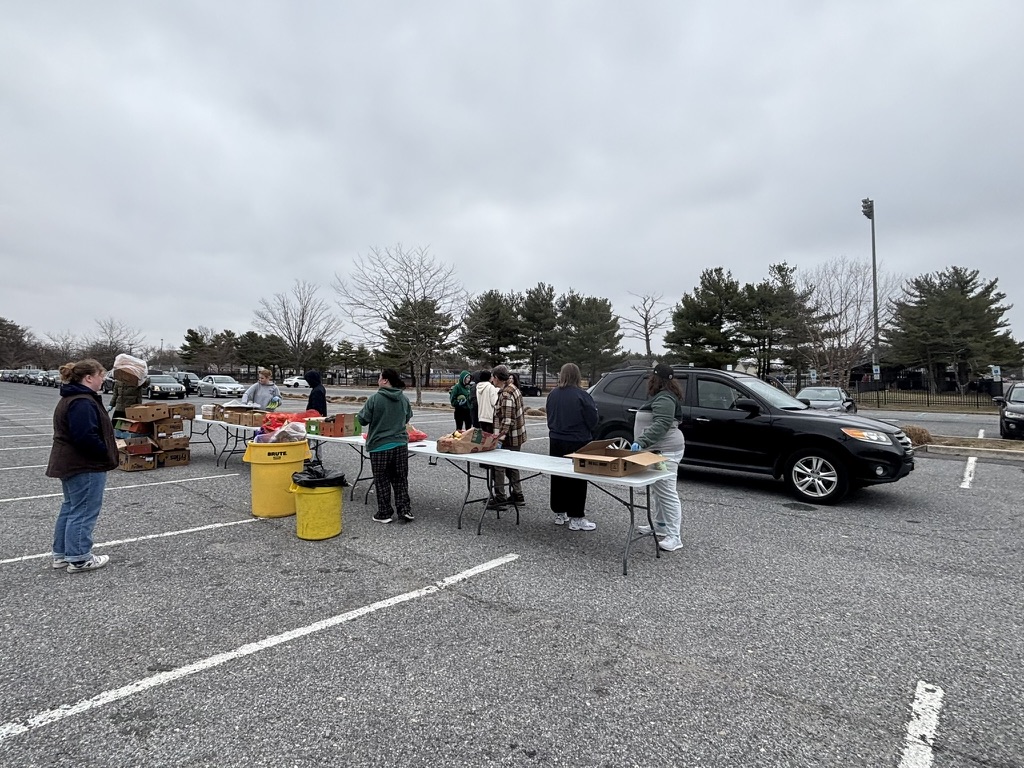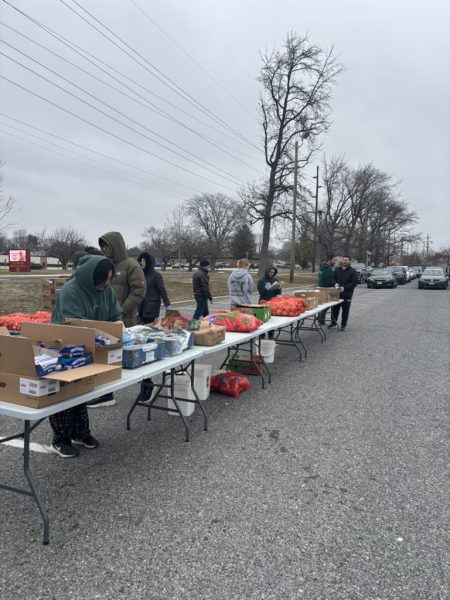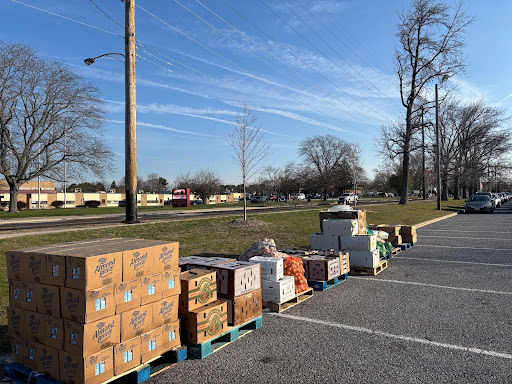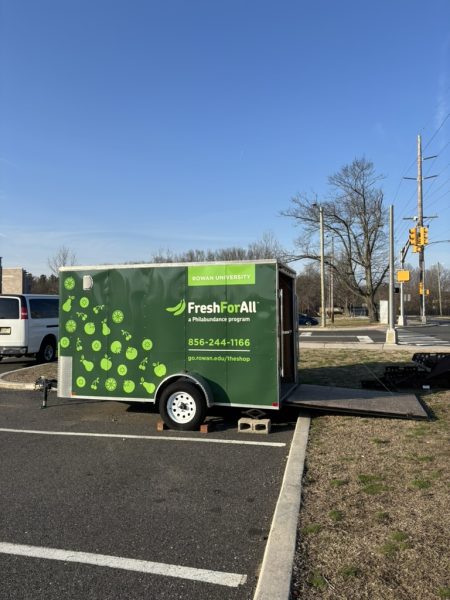
Student volunteers distribute produce at a recent Fresh For All event. (Trinity Eobbi)
On a recent Friday at Rowan University in Glassboro, New Jersey, 65 cars lined up to receive fresh fruits and vegetables at an on-campus food pantry. By the end of the event, around 3,300 pounds of food had been provided for over 300 families.
“Fresh For All is already bigger than we ever thought it would be,” said Dr. Andrew Perrone, Rowan’s assistant director of the Office of Volunteerism and Community Engagement, as he stood alongside the boxes of produce. The department oversees the SHOP Pantry and Resource Center, Rowan’s on-campus food pantry for students in need, as well as Fresh For All.

Fresh For All is a Philabundance program that rescues and distributes food to those in need throughout the Greater Philadelphia region.
In 2018, Fresh For All established a location at Rowan which is open to the university’s students, staff, faculty, as well as the outer Glassboro community. The event operates on Fridays from 9:30 a.m. to 10:30 a.m. in Parking Lot D at Rowan.
“We try to maintain service all year round because there’s a lot of community members who rely on this year round,” Perrone explained.
According to Data USA, 16.4% of Glassboro residents live below the poverty line, a number that is higher than the Gloucester County average of 7.6%.
Individuals who live in poverty are often also food insecure, meaning they have limited access to nutritionally adequate food.
While Fresh For All’s primary mission is to increase accessibility to healthy food, it also has environmentally-driven objectives.
“There is a huge connection between our food and agricultural systems and our climate systems,” noted Garrett Broad, Provost’s Fellow for Sustainability at Rowan University.
This connection is twofold: agriculture is impacting the climate, as it’s responsible for a third of the world’s greenhouse gas emissions which are the primary drivers of climate change, and the climate is impacting agriculture, threatening crop yields with water scarcity, more frequent and extreme events, and heat stress.
“Farmers need an understanding of what their climatic patterns are gonna be and when that changes, that can dramatically change the way they go about producing their crops, the type of crops that can be grown and the quality of those crops,” Broad said. “If there are disasters that knock out a crop season that can have a major impact on things like food security.”
Minimizing food waste can help mitigate climate change by saving resources, which is why Fresh For All does its part to reduce as much waste as possible.

Beginning with their supply, the donations Fresh For All gets from Philabundance come from leftover and surplus crops from farmers and wholesalers.
“Everything either gets served to our clients here today, or it goes to the SHOP pantry and gets served to students over the course of the rest of the week,” Perrone said.
After the event wraps up, facilities pick up the inorganic waste and recyclables, while the organic waste gets taken to a pig farm to be composted.
“We get all this food and it’s reasonable that some of it may be rotted or not serviceable, so that’s what gets composted,” Perrone said.
While the majority of clients drive up to receive their food, there’s also a designated table intended for Rowan students who walk over from their dorms.
“Of the 300 [households] we’ll serve, maybe two dozen will be students,” Perrone said.
But with 44% of college students experiencing food insecurity, there’s a lot of potential for growth when it comes to raising awareness on the resources available to them.
“I think as a community, we can all work together; being more on social media, writing more articles, doing some direct outreach,” suggested Broad.
Enhancing communication about food insecurity on the whole is becoming increasingly important considering the funding cuts that Philabundance, along with many other food assistance organizations, are anticipating in the coming years.
LFPA, the Local Food Purchase Assistance Cooperative Agreement Program, and SNAP, the Supplemental Nutrition Assistance Program, are just two programs who have gotten a lot of attention recently about potential budget reductions.

“It just means less money for farmers and less crops being grown, which can raise prices for everybody, and then less of this food getting to people who really could use the healthy food access,” Broad explained.
Rising tax credit cuts and tariffs are also becoming prominent concerns in the food industry, as they will be propelling even further increases in food prices.
While on the surface Fresh For All is an initiative that addresses food insecurity and waste, it’s also an outlet for people to make connections within their community.
During COVID, Perrone recalls when people would treat Fresh For All as a chance to socialize.
“It was one of the few times during a week that many of these people had other social interaction,” he said. “People would take lawn chairs out of their trunk and they’d be sitting, playing music and talking to each other.”
Emerson Woody, Fresh For All’s Undergraduate Coordinator, sees his role serving the Glassboro community as an immense privilege.
“I speak with virtually the same people every week, and I get to know some intimate details about their lives,” Woody expresses. “Many of those who visit Fresh For All are elderly and/or dealing with major life events like illness or job loss. Those people tend to be more isolated, and I really take that need seriously and hope my short conversations can help in some small way.”